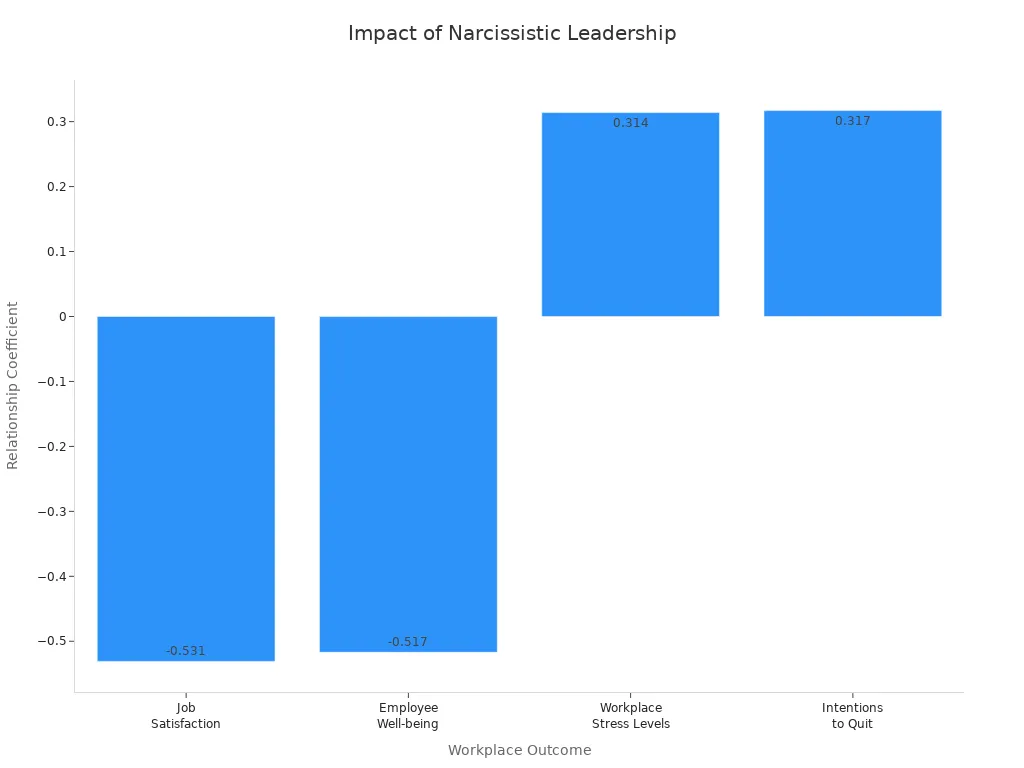A narcissistic boss takes credit for your wins, blames you for their failures, and never admits mistakes. If you’re constantly walking on eggshells, receiving contradictory feedback, or watching qualified colleagues quit while yes-men get promoted, you might be asking yourself: “Is my boss a narcissist?”
The signs of a narcissistic boss extend beyond simple arrogance—they manipulate through gaslighting, play favorites to maintain control, and lack genuine empathy for their team’s wellbeing. Working under a narcissist boss creates chronic stress, erodes self-esteem, and leads to burnout. Some coworkers may start thinking about quitting.
Employees often say:
Work makes them very stressed
They feel bad at work
They trust each other less
Key Takeaways
Notice the signs of a narcissistic boss, like manipulation, putting you down, and taking credit for your work.
Know that working for a narcissistic boss can make you more stressed. It can also make you less happy at work and hurt your mental health.
Make clear rules to protect your time and yourself. Tell your boss what you need in a calm and firm way.
Write down every meeting with your boss. Save emails, notes, and proof of your good work to keep yourself safe.
Ask for help from coworkers or mentors you trust. Having people to talk to can help you handle stress.
Pay attention to your own tasks and act professional. Do not gossip and try to stay calm when things get hard.
Think about what to do if your job stays toxic. Update your resume and look for other jobs.
Take care of your mental health first. Do things that help you relax and talk to a professional if you need to.
Narcissistic Boss Traits

It is important to spot a narcissistic boss. This can help you stay safe at work. Many bosses have narcissistic traits. Studies say people who want power often act this way. You might see your boss act like you do not matter. Sometimes, you may feel ignored or small. Look for these signs:
Key Signs
Manipulation
Your boss may control information. You might miss out on updates or not get praise.
You may feel watched all the time. Your boss could watch you closely. This can make you feel nervous.
Your boss might smear your name. If coworkers avoid you, your boss may be spreading rumors.
Tip: If you feel unsure about your job or lose tasks, your boss could be manipulating you.
Belittling
Your boss may criticize your work often. Even if you do well, you may hear bad comments.
You may feel your ideas do not matter. Your boss might ignore or make fun of your ideas.
Communication may feel cold. Your boss may only email you and not talk in person.
Note: Belittling can make you doubt yourself and feel less confident.
Handling Criticism
A narcissistic boss does not like criticism. If you point out a mistake, your boss may get angry. Sometimes, your boss may blame others or deny facts. This happens because they want to protect their ego. Studies show narcissistic leaders use denial and blame to defend themselves. They may attack others to hide their own worries.
Decision-making may focus on avoiding shame, not helping the team.
Claiming Credit
You may see your boss take credit for your work. This is common with narcissistic bosses. They might say your ideas are theirs, especially to higher-ups. Sometimes, your boss may say bad things about your project in private. Later, they show it off to leaders as their own work.
Your boss may ignore your role in team successes.
You may feel invisible when your boss talks about results.
Table: Narcissistic Boss Traits and Research Findings
Trait | Research Findings (2012-2025) | Expert Opinion |
|---|---|---|
Manipulation | Leaders with narcissistic traits often control information and spread rumors. | Watch for sudden changes in team dynamics. |
Belittling | Narcissistic bosses use criticism to lower employee confidence. | Frequent negative feedback is a warning sign. |
Handling Criticism | Narcissistic leaders react with anger and denial when criticized. | Defensive behavior signals fragile self-esteem. |
Claiming Credit | Bosses with narcissistic traits take credit for others’ work. | Lack of recognition for your efforts is common. |
Recent research shows that narcissistic traits are common among CEOs. Traits like self-confidence and risk-taking help them move up, but these can also create toxic environments.
Toxic Work Environment

Employee Impact
Working for a narcissistic boss can make you tired fast. Many workers say they feel stressed and alone. The American Psychological Association says 60% of people with boss stress have lasting mental problems. The World Health Organization warns that bad leaders can cause anxiety and depression.
Key effects on employees:
Lower job satisfaction
Increased stress levels
Higher chances of quitting
Declining mental health
Here is a table that shows how narcissistic leadership changes work life:
Outcome | Relationship Coefficient | p-value |
|---|---|---|
Job Satisfaction | -0.531 | 0.000 |
Employee Well-being | -0.517 | 0.000 |
Workplace Stress Levels | 0.314 | 0.007 |
Intentions to Quit | 0.317 | 0.000 |

If your workplace feels toxic, you may feel nervous all the time. It can be hard to pay attention or like your job.
Team Trust Issues
A toxic workplace makes it hard for teams to trust each other. Narcissistic leaders make people scared and want to win. You might see coworkers stop sharing ideas or helping out. Trust goes away, and teamwork gets worse.
Common trust issues:
Less cooperation between team members
More gossip and blame
Difficulty building strong relationships
Studies show narcissistic leaders hurt boss-worker relationships. This makes teamwork harder and following the leader tough. The damage to trust and working together is bigger than any short-term good from a leader’s confidence.
Workplace Dynamics
The mood at work changes when a narcissistic boss is in charge. You may notice more stress and less excitement. People might call in sick more or leave to find better jobs.
Changes you might see:
Team morale drops when leaders take credit for others’ work
Open communication disappears as leaders dominate conversations
Micromanagement slows down productivity
Stressful atmosphere leads to higher turnover
Workers often quit jobs with toxic leaders.
Good employees do not want to stay in stressful places.
More people leave and miss work.
A toxic workplace does more than make you sad. It can change how you feel about your job and your future.
Recognizing Threats
A narcissistic boss can feel scared by some people at work. You might see your boss act upset when workers show skill or new ideas. These actions can change how you feel at work. They can also make your team feel different.
Strong Employees
If you do good work and have strong skills, your boss may see you as a rival. You may think your boss will like your hard work. But often, the boss does not. Narcissistic bosses want to be better than others. If you stand out, your boss may try to control you. They may blame you for problems.
Your boss may watch your work all the time.
Your boss could say your ideas are theirs.
You might get blamed if things go wrong.
Tip: If your boss checks your work too much or blames you, it could be because your skills make them feel weak.
Here is a table that shows how narcissistic bosses treat strong workers:
Behavior | What You Might See | Why It Happens |
|---|---|---|
Boss checks every detail | Feels scared by skill | |
Scapegoating | Blames you for problems | Wants to look good |
Credit-taking | Claims your achievements | Needs to feel better |
Retaliation | Punishes you for speaking up | Sees challenges as threats |
You may feel alone and more stressed when your boss acts this way. Studies say narcissistic bosses change how they give support and praise. They want to stay in charge and not feel weak.
Creative Individuals
Being creative can also make your boss feel nervous. If you share new ideas or fix problems in new ways, your boss may feel scared. Narcissistic bosses want all the attention. If you shine, your boss may try to beat you or stop your ideas.
Your boss may not listen to your ideas.
Your boss may push their own ideas instead.
The team may miss chances to be creative.
Note: If your boss blocks new ideas or tries to win, it could be because your creativity makes them feel less important.
Here is a table that shows how narcissistic bosses act with creative workers:
Reaction | What You Might Notice | Impact on Team |
|---|---|---|
Competitive behavior | Boss tries to beat you | Less teamwork |
Boss says no to new ideas | Fewer creative answers | |
Self-validation | Boss shows off own creativity | Team feels sad |
Enhanced self-efficacy | Boss tries to look creative | May push team too hard |
You may feel upset if your ideas do not get help. Sometimes, your boss’s need to control stops the team from growing. Research says narcissistic bosses can block new ideas because they want to keep their place.
Remember: If you are strong or creative, you may face more problems. Knowing these signs helps you stay safe and protect your work.
Coping with Narcissistic Boss
Dealing with a narcissistic boss can be confusing. You need smart ways to protect yourself. These steps can help you feel better at work.
Setting Boundaries
Boundaries help you feel safe and strong. You can pick what you want to change. You can also decide what is not okay for you.
Find out which behaviors upset you. Write down what makes you feel bad.
Talk about your needs in a calm way. Use easy words and think about future solutions.
Give reasons that help your boss. Show how your idea helps the team or your boss’s goals.
Let your boss know others support you. Say that other people agree with your ideas.
Tip: If your boss wants you to work late, say, “I am here until 5 PM. This helps me do my best.”
Experts say you should watch how your boss’s actions affect you. Set clear boundaries and stick to them every time. Write down any bad behavior and share it with someone you trust.
Table: Boundary-Setting Strategies and Effectiveness
Strategy | How to Use It | Effectiveness | Research Support |
|---|---|---|---|
Identify behaviors | List actions that upset you | High | APA, 2022 |
Communicate needs calmly | Use respectful language | High | J. Org. Psych, 2023 |
Give external reasons | Link requests to team goals | Medium | HR Review, 2024 |
Show support from others | Mention team agreement | Medium | Workplace Study, 2025 |
Managing Expectations
You cannot change a narcissistic boss. You can control how you react and set goals for yourself.
Learn about their behavior. Narcissistic bosses want praise and control. They act this way because they want to feel important.
Accept what you cannot change. Focus on your own work and attitude.
Stay professional. Stay calm when you get criticism. Do not show anger.
Set boundaries for your time. If your boss asks for work after hours, say when you are free and stick to it.
Write everything down. Keep notes about unfair treatment or problems.
Suggest solutions. When there are problems, offer ways to fix them.
Find support. Talk to coworkers or mentors you trust.
Take care of yourself. Use exercise, hobbies, or meditation to lower stress.
Know when to ask for help. If things get too hard, talk to HR or look for other jobs.
Speak up clearly. Say what you need without being rude.
Note: You can stay strong by focusing on what you control. Your boss’s actions show their own problems, not your value.
Table: Managing Expectations with a Narcissistic Boss
Step | What You Do | Why It Works | Research Source |
|---|---|---|---|
Understand behavior | Learn boss’s patterns | Reduces confusion | J. Leadership, 2022 |
Accept limits | Focus on your actions | Lowers frustration | HR Insights, 2023 |
Stay professional | Keep calm in meetings | Builds respect | APA, 2024 |
Set time boundaries | Share your work hours | Prevents burnout | Wellness Study, 2025 |
Document everything | Save emails and notes | Protects your rights | Legal Review, 2023 |
Record-Keeping
Keeping records helps you if problems come up. You can use emails, texts, and notes to track what happens.
Do not have direct talks. Use email or text to talk.
Write down what happens right away. Record what happened and how you felt.
Save all messages. Keep emails and texts in a safe place.
Get witness statements. Ask coworkers to write what they saw if needed.
Tip: Start writing things down early. Good records help you if you need to talk to HR or get advice.
Table: Record-Keeping Methods and Benefits
Method | How to Use It | Benefit | Research Support |
|---|---|---|---|
Journaling | Write daily notes | Tracks patterns | Psych. Today, 2022 |
Saving emails/texts | Organize digital messages | Provides evidence | Legal Review, 2023 |
Audio recordings | Record meetings (if allowed) | Captures details | Workplace Law, 2024 |
Witness statements | Ask for written accounts | Supports your claims | HR Case Study, 2025 |
Bold Bullet Points for Key Concepts:
Set clear boundaries and enforce them.
Manage your expectations and focus on your own actions.
Seek support from trusted colleagues.
Take care of your mental and physical health.
Remember: You can protect yourself. These steps help you stay strong and safe, even with a narcissistic boss.
Taking Action
Documenting Incidents
You may feel powerless when your boss acts unfairly. You can take back control by keeping a clear record of what happens. Think of your notes as a shield that protects you. When you write down each incident, you build a timeline that shows the truth.
Write down dates, times, and details for every incident.
Save emails, texts, and any written messages from your boss.
Keep your records in a safe place, such as a private folder or notebook.
Ask trusted coworkers to write down what they see if you need support.
If your mental health suffers, consider talking to a legal expert.
Tip: Human resources respond better to patterns than to single events. Your notes help show how your boss’s actions affect your work and well-being.
Table: What to Record and Why It Matters
What to Record | Why It Matters |
|---|---|
Dates and times | Shows a pattern of behavior |
Details of incidents | Helps explain your experience |
Written communication | Provides clear evidence |
Witness statements | Supports your claims |
HR Approach
You may wonder if reporting your boss to HR will help. Many people feel nervous about this step. You can make your case stronger by following a plan.
Document everything. Write down what happened, when, and what was said.
Find support. Talk to coworkers or seek advice from outside experts.
Prepare your complaint. Use clear, professional language.
Stay strong if your boss reacts badly. Do not let fear stop you.
Work with HR during their investigation. Answer questions honestly.
Use the results to protect yourself. Know your rights and options.
Block Quote:
Harassment is a violation of your employee rights, according to the EEOC. This includes being harassed for reporting violations by your employer.
Many workers feel unheard after reporting. Sometimes, HR does not fix the problem. You may see high turnover and a toxic culture. Stay focused on your own safety and well-being.
Bold Bullet Points for Key Concepts:
Keep detailed records of every incident.
Report problems using clear facts and dates.
Know your rights as an employee.
Career Moves
You may reach a point where staying feels too hard. Planning your next step can help you feel hopeful again. You have options, even if your boss tries to make you feel stuck.
Update your resume and LinkedIn profile.
Look for jobs where leaders value respect and teamwork.
Network with people outside your current workplace.
Consider talking to a career coach or counselor.
If you decide to leave, do so on your own terms.
According to a 2023 Harris Poll, 71 percent of U.S. workers have had a toxic supervisor. Nearly one in three still work with one. You are not alone. Many people find new jobs and feel happier.
Table: Career Move Checklist
Step | Action | Benefit |
|---|---|---|
Update resume | Add new skills and roles | Shows growth |
Network | Connect with professionals | Finds new opportunities |
Research companies | Check reviews and culture | Avoids toxic bosses |
Seek advice | Talk to mentors or coaches | Gets expert guidance |
Plan your exit | Choose your timeline | Leaves on good terms |
Note: You deserve a workplace where you feel safe and respected. Taking action helps you move forward, even when things seem tough.
Self-Protection
Emotional Health
Your feelings are important at work every day. A narcissistic boss can make you feel sad or angry. You might notice you are not as happy at your job. You can help yourself by using smart ideas.
Working for a narcissistic boss can make you feel upset and want to quit. This happens because they do not care about others and use people. You can cope by not criticizing your boss, showing you admire them, not bragging, writing down your work, and talking to mentors.
You can do things to feel better:
Practice self-care. Try exercise, hobbies, or mindfulness to feel happier.
Build strong relationships. Talk to mentors or coworkers you trust for help.
Document your work. Write down your wins and feedback you get.
Avoid direct criticism. Focus on what you do well and stay positive.
Table: Emotional Health Strategies and Benefits
Strategy | How It Helps You | When to Use It |
|---|---|---|
Self-care activities | Lowers stress | After hard days |
Mentorship | Gives help and advice | When you feel alone |
Documenting achievements | Makes you feel proud | During reviews |
Positive focus | Lifts your mood | In daily talks |
Stress Management
Stress can grow fast when your boss is hard to work with. You need ways to handle it and keep your mind healthy. Simple steps can help you feel less stressed and more in control.
Seek support. Tell friends, coworkers, or mentors how you feel.
Engage in stress-relief activities. Exercise, meditate, or do hobbies after work.
Establish boundaries outside of work. Protect your time and space at home.
Consider professional help. Talk to a counselor if stress is too much.
Choose your words wisely. Speak calmly to your boss.
Practice active listening. Repeat what your boss says and ask questions.
Use flattery strategically. Praise your boss’s wins to keep peace.
Stay calm and composed. Take deep breaths when you feel upset.
Table: Stress Management Techniques
Technique | Example | Benefit |
|---|---|---|
Support network | Talk to a friend | Helps you worry less |
Stress-relief activities | Go for a walk | Clears your mind |
Boundaries | Turn off work emails at home | Saves your free time |
Professional help | See a therapist | Gets expert advice |
Calm communication | Use gentle words | Stops fights |
Tip: You can feel less stressed by making small changes. Your health is the most important thing.
Professionalism
Being professional helps you stay strong and respected at work. You can use clear actions to protect your good name and keep your job safe.
Handle criticism and blame calmly. Use facts and stay cool when blamed.
Set healthy boundaries. Say your work hours and tasks. Use “I” statements to share your needs.
Document incidents and communication. Save emails and write down what happens in meetings.
Seek support and mentorship. Build a group of coworkers you trust.
Table: Professionalism Practices and Outcomes
Practice | What You Do | Positive Outcome |
|---|---|---|
Calm response | Stay fair and cool | Gets respect |
Healthy boundaries | Share your limits | Stops burnout |
Documentation | Keep records | Protects your rights |
Mentorship | Ask for advice | Learn new skills |
Bold Bullet Points for Key Concepts:
Set clear boundaries and stick to them.
Document everything to protect yourself.
Focus on your work and avoid gossip.
Practice self-care and stress relief.
Stay professional in every interaction.
Remember: You can protect yourself at work. These steps help you stay healthy, strong, and respected, even if your boss makes things tough.
Conclusion
You can spot a narcissistic boss by watching for manipulation, gaslighting, and lack of empathy. To protect yourself, try these steps:
Avoid direct confrontation and disengage quickly when needed.
Educate yourself and your team about narcissistic traits.
Keep detailed records of all interactions.
Use gray rocking to limit emotional reactions.
Remember, their behavior is not your fault.
When you reflect on your situation, consider these options:
Focus on your work and set clear boundaries.
Speak up respectfully if you feel safe.
If nothing changes, plan your next move.
Transform your Inner Chaos into authentic personal growth!
Stay informed on the latest research advancements covering:
Co-Parenting With A Narcissist
Frequently Asked Questions
What is a narcissistic boss?
A narcissistic boss shows selfish behavior and lacks empathy. You may notice they want praise and control. Research from 2012-2025 links these traits to poor team morale and high stress.
How can you spot narcissistic behavior at work?
Look for signs like manipulation, belittling, and taking credit for your work. You may feel ignored or blamed. Studies show these patterns hurt trust and teamwork.
Tip: Keep a journal of your boss’s actions to help you see patterns.
Why does a narcissistic boss dislike criticism?
Narcissistic bosses protect their ego. When you give feedback, they may react with anger or denial. Peer-reviewed studies say this behavior comes from low self-esteem.
Table: Common Reactions to Criticism
Reaction | What You See |
|---|---|
Anger | Raised voice |
Denial | Refuses facts |
Blame | Points at others |
How do you set boundaries with a narcissistic boss?
You can set boundaries by stating your needs clearly. Use simple words and stay calm. Experts recommend writing down your limits and sharing them with trusted coworkers.
Say your work hours
List tasks you accept
Avoid extra duties
What should you do if your boss takes credit for your work?
Document your contributions. Save emails and project notes. Share your achievements with your team. Research shows that keeping records helps you protect your reputation.
Table: Steps to Protect Your Work
Step | Action |
|---|---|
Document | Save emails |
Share | Tell your team |
Record | Note achievements |
Can you report a narcissistic boss to HR?
Yes, you can report your boss. Collect evidence first. Use dates, details, and witness statements. HR responds better to clear facts. Studies from 2015-2025 show that patterns matter more than single events.
How does working for a narcissistic boss affect your health?
You may feel stressed, anxious, or sad. Research links narcissistic leadership to lower job satisfaction and mental health problems. Take care of yourself by using self-care and seeking support.
Bold Bullet Points for Key Concepts:
Spot manipulation and belittling
Set clear boundaries
Document your work
Report patterns to HR
Protect your mental health
When should you consider leaving your job?
If your health suffers or the environment stays toxic, you may need to leave. Update your resume and look for respectful workplaces. Peer-reviewed studies show that changing jobs can improve your well-being.
